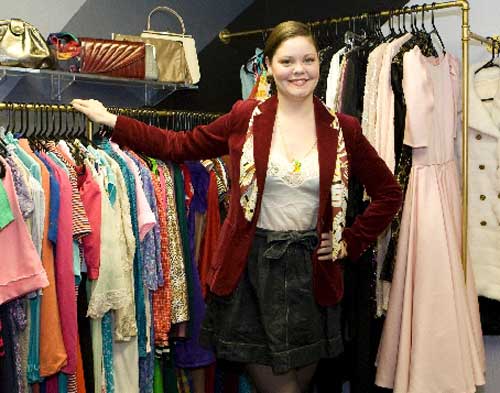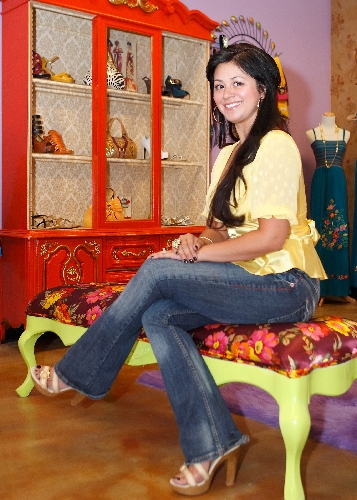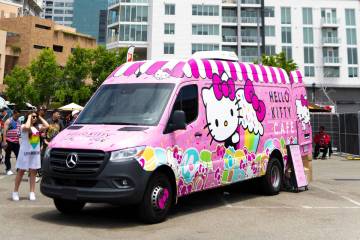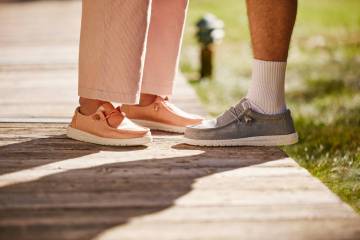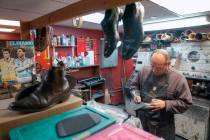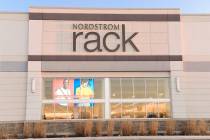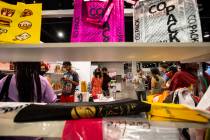Shop ’til You Drop (Bad Habits)
There's nothing like a good recession to teach frivolous shoppers all the hard-learned lessons Suze Orman couldn't. Mindless credit card swipes and one too many "I deserve it" justifications at Barneys come to a quick halt when the economy decides a layoff or home foreclosure is more deserved. That's not to say consumers have surrendered retail shopping altogether. They've just adopted new habits.
"People realize they can't shop how they used to," says Patty Barba. "They pay their bills first now, instead of shop first."
Barba opened a fashion retail boutique, Patty's Closet, just before the clock struck 12 on Las Vegas' robust economy. Lucky for her, her concept of modestly priced (tops start at $17), trendy clothes with styles in only three sizes each not only survived the recession, it thrived during it. Barba has since opened two more Patty's Closet boutiques and Voluptuous, a plus-size boutique in Henderson.
Not far from the exclusive Anthem community, her stores pull in shoppers who used to strictly frequent Neiman Marcus and Saks Fifth Avenue. Barba isn't surprised, either. For these women, retail therapy comes down to stuffing the car trunk with shopping bags. At Patty's Closet and Voluptuous they can continue doing so, guilt and debt free.
Shoppers have become more deal-conscious, too. They hunt down extra savings on Facebook, Twitter and any other instantaneous resource they can find. For instance, Barba's Text Club alerts shoppers to coupons and sales via text messages to their cell phones. "At least 50 to 75 percent (of shoppers) come back for those," she says.
The savvy retail consumer today is no longer satisfied with just snagging a super cute dress. It has to come with bragging rights. A price low enough to drop a jaw constitutes as such these days. But, so does rarity, which is why gently used and vintage clothing are experiencing a high point. The bragging rights come in double doses.
That could explain why three spaces dedicated to recycled clothing have sprouted in Emergency Arts, a creative collective downtown. Jennifer Henry, owner of Flockflockflock, cleans out elderly women's closets in search of vintage gems and turns them around for $15-$30 a pop. She sells the kind of garments Krystle Carrington and Holly Golightly would have donned, but at prices they would have snubbed.
Henry sees the vintage popularity as a newfound recognition of value. "People thought of (vintage) as a costume," says Henry. "Now it's about having a quality garment."
Haute Thrif'Ture is just across the hall, the signage paint still drying. Owner Emika Porter plans to use the 80-square-foot space as a fashion exchange and borrowing boutique when it opens Nov. 20.
She started Haute Thrif'Ture as a personal styling service which obtained its clothes from thrift stores. After holding a couple fashion exchange events with great success, the idea wheels started turning and she decided to move in a different direction. She'll exchange clothes with customers who meet her "vintage chic" standard, but borrowing is for members only.
"In the 2½ years I've been doing this, I've definitely seen a demand increase," says Porter. "Nobody will spend retail prices anymore because they know they don't have to."
Tough times tend to foster creative minds and Altered Nation Designs, also at Emergency Arts, is a perfect example of this. Owner Susan Tosches-Deneau has mastered the art of clothing reincarnation.
She can turn a T-shirt into a pillow case or a dress into a tote bag. She's also a godsend for the "shop your own closet" concept so many women's magazines now champion. Tosches-Deneau can give '50s and '70s garments modern silhouettes, turn a maxi into a mini or embellish an old T-shirt.
She sees the newfound interest in secondhand clothing as something more than just bargain-hunting and standout quality. "It's a way for the community to support small businesses and the local economy," Tosches-Deneau says.
Vintage fan or not, that's a cause everyone can get behind. It's just one example of retail shoppers knowing better and thus doing better, something that's happening on a national scale.
"People are being very careful now," says David Wolfe, creative director for The Doneger Group, a global market trend forecasting company. "Most people who should've never stepped foot in Louis Vuitton to begin with, will probably never go back."
That's not to say the urge isn't still there. For those who don't trust themselves to window shop, websites such as polyvore.com let them do the equivalent online. With no credit card prompt, its features strictly serve the idea of styling (there are links to other shopping sites, however). Like near beer for recovering alcoholics, visitors get the taste without the shopping hangover.
When consumers resort to shopping habits well-suited for Mr. Rogers' Neighborhood of Make-Believe everyone takes notice. Even the high-fashion designers whose customers flipped their dictionaries to the word "budget" when the economy took a nosedive three years ago.
Todd Hanshaw, divisional merchandise manager at Wynn and Encore, noticed many designers' cost-saving attempts took a toll on their collections, which put customers on high alert. Some of the clothing saw a demotion in terms of quality, going from designer to contemporary, yet held onto the designer price tags.
"That was the danger zone," Hanshaw says.
The luxury shopper has had to adjust with the rest of them. Now it's about paying closer attention to what is on the racks in front of them. They're establishing new loyalties, separating designers with integrity (Hanshaw cites Giambattista Valli as one example) from the rest of the bunch.
The retail rehabilitation we've seen in shoppers across the board has been a good sign of consumers recognizing a reality check when they see one. But, will everyone fall off the wagon once the economy makes a full recovery?
"This has been such a wake-up call for everyone," Wolfe says. "They've kicked the habit. We're living in a different retail landscape."



